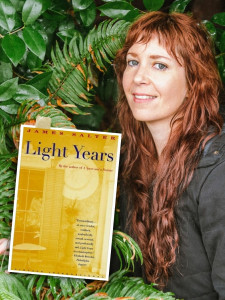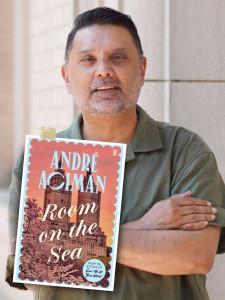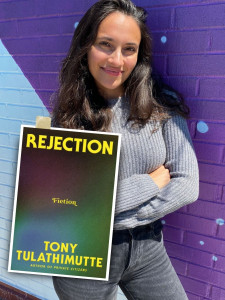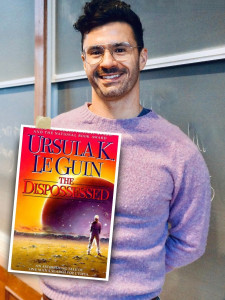
Dear Reader: Here’s What Duke Faculty Are Reading This Summer
What’s on summer reading lists for Duke professors? As the campus quiets down and the days stretch longer, faculty are diving into books that inspire, challenge and entertain. Whether it’s exploring new ideas, escaping into gripping stories or coming back to classics with fresh eyes, these picks reveal a lot about what’s sparking curiosity and conversation behind the scenes at Duke.
From sharp literary fiction to provocative nonfiction, here’s a glimpse at what some of Duke faculty are reading this summer. Grab your favorite chair, pour a cold drink and settle in for some seriously good reading recommendations.
And who knows? Maybe you’ll find something to add to your own TBR pile.
Mesha Maren
Associate Professor of the Practice of English and author of “Sugar Run,” “Perpetual West,” and “Shae”
“Light Years” by James Salter: James Salter’s “Light Years” captures a marriage that looks perfect on the outside, with its elegant dinners, beach days and clever children, but is quietly fracturing from within. A haunting, lyrical novel, it’s about the quiet collapse of love and the emptiness beneath a beautiful life.
“Dog of the South” by Charles Portis: In “The Dog of the South,” Ray Midge chases down his runaway wife and her new lover, guided only by credit card receipts. What follows is a weird, wonderful road trip full of busted cars, sketchy motels, con men and a maybe-rat from not-Paris.
Amin Ahmad
Lecturing Fellow of English and author of the forthcoming thriller, “A Killer in the Family” (February 2026)
“Age of Vice” by Deepti Kapoo: At the center of “Age of Vice” are a poor servant, a reckless heir, and a journalist caught in the crossfire. Starting with a deadly car crash in New Delhi, and spiraling into a gripping tale of wealth, corruption, and violence, this a high-octane, cinematic novel about how far power can pull people — and what’s left when it all comes crashing down.
“Room on the Sea” by André Aciman: In “Room on the Sea,” two strangers meet during jury duty and slip into a week-long affair that’s as intense as it is impossible. André Aciman writes a tender, sultry tale of middle-aged longing, quiet connection and the ache of what might have been.
Sarah Balakrishnan
Assistant Professor of History and award-winning writer
“Rejection” by Tony Tulathimutte: “Rejection” is a darkly funny, razor-sharp novel-in-stories about sex, loneliness, and the emotional wreckage of modern life. Through a web of painfully relatable characters, it explores how badly we want to be seen, and how far we’ll spiral when we’re not.
“Long Distance” by Ayşegül Savaş: Out July 8, “Long Distance” is a quietly devastating story collection about people in transit — between countries, relationships, and versions of themselves. Whether it’s a lover who’s changed, a friend who’s moved on, or a secret shared too soon, Savas captures the ache of distance with sharp, elegant precision.
Zakiyyah Iman Jackson
Associate Professor of Literature
“The Blue Clerk” by Dionne Brand: In “The Blue Clerk,” Dionne Brand imagines a lyrical, layered dialogue between a poet and the mysterious clerk who guards all her unwritten pages. Through a series of haunting prose poems, the two wrestle with memory, silence, history, and the act of writing itself.
“Oreo” by Fran Ross: “Oreo” is a one of-a-kind satire that reflects on race, identity and family. Oreo, born to a Black mother and Jewish father, grows up in Philly but sets off to New York to find her dad — only to discover there are way too many Sam Schwartzes to track him down easily. Equal parts sharp social commentary and wild adventure, “Oreo” flips the script on both race and genre.
Nima Bassiri
Andrew W. Mellon Assistant Professor of Literature
“The Dispossessed” by Ursula K. Le Guin: In “The Dispossessed,” Ursula K. Le Guin sends Shevek — a brilliant thinker from an isolated anarchist planet — on a risky mission to bridge two worlds. As he challenges power, borders and the cost of progress, this sci-fi classic reveals itself to be a profound meditation on freedom, sacrifice and what it means to build a better future.
“A Democratic Theory of Truth” by Linda M. G. Zerilli: In “A Democratic Theory of Truth,” political theorist Linda M. G. Zerilli pushes back against the idea that clinging to objective truth will save democracy. Drawing on thinkers like Arendt and Foucault, she argues that truth in politics isn’t handed down, it’s shaped through debate, dissent and the messy work of collective judgment.








